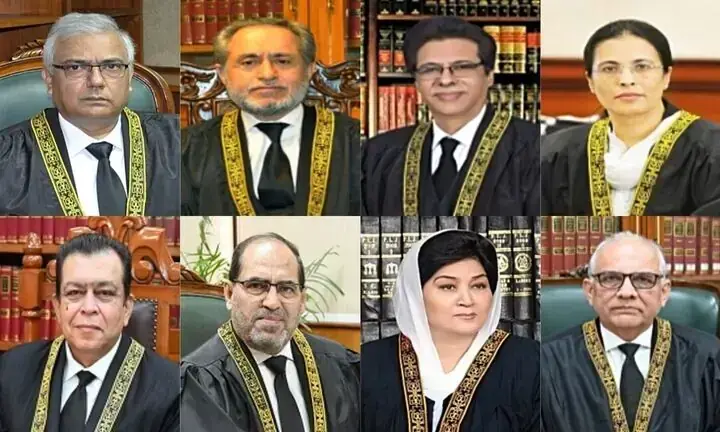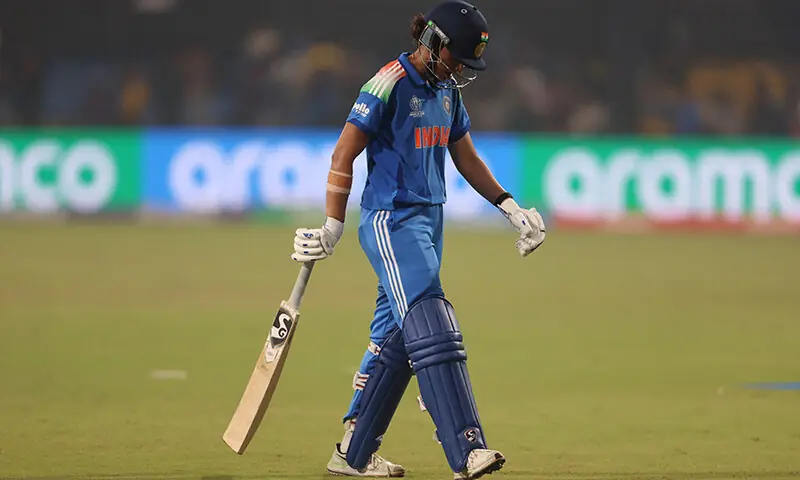An eight-judge constitutional bench (CB) of the Supreme Court (SC) on Wednesday began its deliberations on petitioners’ request to form a full bench to hear a set of pleas challenging the 26th amendment.
The amendment, which was passed by both houses of Parliament in October last year, altered judicial authority and tenure, and has been a lightning rod for debate with opposition parties and legal experts questioning its impact on the autonomy of the judiciary.
It removed Suo Motu powers from SC, set the term of Chief Justice of Pakistan (CJP) at three years and trained a special parliamentary committee for appointment of CJP from among the three most senior SC judges. It also paved the way for the formation of the CB, which is now hearing petitions against the very legislation that allowed its establishment.
The legislation had been challenged by several bar associations, bar councils, lawyers, PTI and some politicians. The SC also came forward with separate petitions seeking formation of a full bench to hear the matter, instead of the CB.
The CB is headed by Justice Aminuddin Khan and also includes Justices Jamal Khan Mandokhail, Muhammad Ali Mazhar, Ayesha Malik, Syed Hasan Azhar Rizvi, Musarrat Hilali, Naeem Akhtar Afghan and Shahid Bilal Hassan. It resumed proceedings yesterday after more than eight months, unanimously allowing live streaming of the case at the request of some petitioners.
The pleas taken also seek formation of a full tribunal to hear the matter. Therefore, before proceeding, the court will first determine whether the challenges should be heard by a full bench comprising all available SC judges or by the same eight-judge CB.
During today’s hearing, Lahore High Court Bar Association (LHCBA) lawyer Hamid Khan sought formation of a 16-member bench to hear the pleas, based on the number of SC judges at the time of the 26th Amendment.
Several judges, including Justice Aminuddin, observed that the 26th amendment was currently part of the constitution. Some judges questioned whether the CB had the power to form a full court, while Justice Malik noted that there were no restrictions on issuing a court order for that.
The hearing was adjourned until 11:30 am tomorrow.
Requests to form a full court bench and livestream the case dominated yesterday’s hearing, and the state’s attorney expressed no objection to livestreaming the proceedings.
Commenting on today’s hearing, Tehreek-i-Tahaffuz Ayeen-i-Pakistan (TTAP), vice-president of Mustafa Nawaz Khokhar, who is one of the petitioners, said: “Justice Ayesha stood out with her observations, while her colleagues seemed to take refuge in the ‘loftiness of’ state loftiness of Article 5.”
The audience
At the beginning of the hearing, lawyer Hamid came to the rostrum and said that the 26th amendment was introduced in an “unusual” manner and passed parliament in the evening.
Hamid recalled that there were 17 judges present in the SC at the time the legislation was passed, including the then CJP Qazi Faez Isa, who later retired. Therefore, he claimed, a “16-judge bench” should henceforth hear the pleas and note that all eight judges in the current CB would be part of that bench as they were already serving as SC judges in October last year.
According to the SC website, there are currently a total of 24 judges in the SC, including CJP Yahya Afridi, after six new judges were appointed in February.
“This amendment is against the very basic features of the Constitution,” he stated, in which Justice Mandokhail said the matter will be deliberated later and asked if the amendment was currently part of the constitution.
In response to Hamid’s arguments, Justice Aminuddin commented: “We depend on the Constitution. Lawyers also depend on the Constitution. Unless the Constitution is [further] Amended, we will have to depend on the current constitution.”
Justice Hilali also observed that whether the 26th amendment was “right or wrong”, the court had not yet stayed it. “He considers the 26th Amendment to be a part of the Constitution, which is why he has challenged it.”
Here, Justice Mazhar noted that the CB was not considering the main issue of legality of the legislation but the application of a full bench and sought arguments on the same.
Hamid responded that he was not detailing how the 26th Amendment was unconstitutional, but rather the “effects of its powers.” He said it was for the first time after the legislation that the “authority to form banks was taken away from the Chief Justice.”
Noting that the Judicial Commission of Pakistan (JCP) existed before last year’s constitutional adjustments, the LHCBA lawyer said the 26th amendment impacted the formation of the JCP when “judges became a minority” after the number of its members increased.
“After the amendment, the majority of the Judicial Commission was on the administrative side, which affected judicial independence,” said Hamid.
After Judge Mandokhail asked Hamid if he was recognizing the 26th Amendment or not, the lawyer responded in the negative.
At this point during the hearing, Justice Mazhar wondered whether a bench constituted after the 26th Amendment could decide a plea seeking formation of a full bench.
Justice Mandokhail, however, commented that the amendment was part of the constitution for now. In Justice Afghan pointing out that Hamid had not specified in his petition that “to whom the bank should send the case”, the lawyer said the matter should be referred to the CJP.
Justice Hilali also asked whether LHCBA’s counsel had made any application to the authority responsible for establishing the banks. To this, Hamid responded: “We are challenging the formation of the bank, which was constituted under the influence of the 26th Amendment.”
Here, Justice Aminuddin observed: “At this juncture, [we are] Not at such a stage to consider who will hear the case. There may possibly be hearings for a month on who will hear the case,” he added.
“On what basis are you saying we can’t hear the case?” The CB chief questioned Hamid, saying it was not within the judges’ control to “go back before the 26th Amendment.”
At this point during the hearing, Justice Malik said, “If a full court hears or a bench, no one is stopping any court order. The process continues after a court order.
“Where is it prohibited below the 26th amendment?” he asked, to which Hamid replied that the legislation did not do so.
Justice Malik observed: “When there is an application to form a bank, we do not question the procedure. We give instructions, after which the process begins.”
Here, Justice Aminuddin wondered under what authority the CB would constitute a full court, after which Justice Malik said there was “no restriction on forming a full court under a court order.”
“Where in the 26th Amendment does it say that a warrant cannot be issued? This is being done in ordinary cases, why not in this case?” She responded.
Justice Afghan again raised the issue of Hamid without mentioning such a request in his petition.
After Justice Mazhar asked whether the CB could use Article 187 (issuance and execution of SC proceedings) of the Constitution to issue the order of a full bench, Hamid replied in the affirmative.
At one point during the hearing, Justice Mandokhail commented that the CB was not conceptualized by the SC but by Parliament. When Hamid said the bench should “forget” Article 191a, under which constitutional benches were formed in the Apex court, Justice Aminuddin said if that was forgotten, the SC would no longer exist.
“A full court was always formed whenever questions about the constitution were raised,” Hamid emphasized.
Given this, Judge Mandokhail wondered if a “point decided by 17 judges in the past” can be reversed, to which the lawyer responded in the negative. “Won’t you be happy if the previous decision is upheld and now a smaller bank hears the case?” the judge asked.
However, Justice Afghan noted that the Supreme Court (Practice and Procedure) Act, 2024 did not exist in the past. He commented that the CJPs in the past “continued to use their powers to constitute full courts”, but now that authority lied to the SC Practice and Procedure Committee “as per the Constitution and the Law”.
The requests
The petitioners have asked the Apex Court to strike down the entire 26th Amendment on grounds of procedural impropriety if it is found that the requisite two-thirds of the legally elected membership of each House were not freely exercising their right to vote in favor of the same as required in Article 239, which elaborated in the bills and their passage to amend the Constitution.
In the alternative, the petitioners stated, the Court should curtail certain provisions of the 26th Amendment because they substantially undermine the independence of the judiciary, which is a most prominent feature of the Constitution.
These included the provisions for annual performance appraisals of High Court judges by the Judicial Commission of Pakistan inserted in Article 175A (1) and Articles 175a (18) to (20); The provisions related to the appointment of the CJP are the replacement of Article 175A (3), and the provisions of constitutional benches in the SC and High Courts.
Consequently, the Court must declare that the original Article 175A (3) holds the field and directs the federal government to notify the highest judge of SC as CJP in accordance with the original Article 175A (3), the petitioners argued.
The petitioners also challenged the constitutionality of the constitutional benches, arguing that the SC should declare invalid all amendments for which the votes of such members whose electoral disputes were pending were necessary to achieve the numerical threshold prescribed in Article 239.
They also asked that the Practice and Procedure Act 2024 and the Supreme Court (Number of Judges) Act 2024 be declared unconstitutional, void ab initio and of no legal effect, as they arise from an “unconstitutional” amendment and represent an attempt to achieve unconstitutional designs.








